Photo Coverage: Christine Ebersole Sings George Gershwin
Kay Swift is best remembered for her love affair with George Gershwin, but a celebration of the two songwriters Thursday evening at the Paley Center for Media in New York shed light on Swift's professional accomplishments, which included transcribing and arranging Gershwin's music and writing her own Broadway scores. Christine Ebersole headlined the performance segment of "George Gershwin and Kay Swift: An Evening of Song and Television."
The event also showcased the invaluable archives of the Paley Center (formerly the Museum of Television & Radio), as radio and TV clips from the collection were aired in telling the story of Swift and Gershwin's relationship and work. Excerpts included a 1932 episode of Rudy Vallee's radio variety program The Fleischmann Hour; Ethel Merman performing "I Got Rhythm" on Texaco Star Theater in 1949; an Ella Fitzgerald/Frank Sinatra duet of Swift's "Can't We Be Friends?" on The Frank Sinatra Show in 1958; and Swift's interview for the 1980s American Masters documentary "George Gershwin Remembered." In her welcoming remarks, Paley Center president Pat Mitchell reminded the audience that they can watch or listen to the programs in their entirety if they visit the museum during regular public hours.
"George Gershwin and Kay Swift: An Evening of Song and Television" was curated by Rebecca Paller and hosted and narrated by Aaron Gandy, a music director for the Paley Center who contributed to Harold Arlen and Jule Styne tributes at the museum and has restored scores for City Center Encores! Also performing live at the event were Klea Blackhurst and Jimmy Ray Bennett. Special guests in the audience included Swift's granddaughter Katharine Weber; radio host Bob Sherman of WQXR; and music historian Robert Kimball, artistic advisor to the Ira Gershwin Trust.
Most of the songs performed were by Kay Swift, including three from Fine and Dandy, the 1930 show that was the first hit Broadway musical scored by a woman. Swift's lyricist was Paul James, the pen name of James Paul Warburg, the banker to whom Swift was married—with three children—when she met Gershwin in 1925 and throughout most of their affair (she and Warburg divorced in 1934). Gershwin recommended Swift for a job he turned down, scoring a George Balanchine ballet. It became Alma Mater, which ran on Broadway in the mid '30s. Swift and Gershwin ended their relationship when he departed for Hollywood circa 1936, and host Gandy suggested that the breakup inspired "Let's Call the Whole Thing Off," which Gershwin penned for his first Hollywood project, the Astaire/Rogers film Shall We Dance.
Other TV clips screened at the event were Leslie Uggams singing "Someone to Watch Over Me" on the 1972 TV special 'S Wonderful, 'S Marvelous, 'S Gershwin and an interview with John Bubbles (the original Sportin' Life) for the early-'60s CBS series American Musical Theatre. The most amusing was a number from the 1972 TV production of the Gershwins' Of Thee I Sing, starring everybody's favorite musical leading man, Carroll O'Connor, and featuring a hoofing Jim Backus and a then-45-year-old Cloris Leachman playing a new bride and mother. If you want to see the whole show, or anything else from decades of broadcasting, check out paleycenter.org.
Music director and host Aaron Gandy presented a terrific history lesson for music and theater buffs. He told, among other things, of how Kay Swift worked closely with George Gershwin as he created Porgy and Bess. "It was widely known that she could play every bar of every page of that score, and that thing is that thick," said Gandy. One-fourth of the score was cut (for time) during the opera's Boston tryout, and decades later Swift would successfully fight to have it all reinstated for the 1976 Broadway revival. She also traveled the world to publicize the 1959 film version of Porgy, and for years after George's death collaborated with Ira Gershwin on preserving and promoting his legacy.
Christine Ebersole performed selections from both the George Gershwin and Kay Swift songbooks.
Klea Blackhurst sings Swift's "Up Among the Chimney Pots," from Nine-Fifteen Revue of 1930, with Joseph Thalken on piano.
When Jimmy Ray Bennett came on stage to sing "Whistling in the Dark"—one of Kay Swift's earliest songs—host Aaron Gandy quipped that this would be "perhaps its first public performance since 1929," when it was sung in The Little Show. That revue also introduced "Can't We Be Friends?," one of Swift's most enduring tunes.
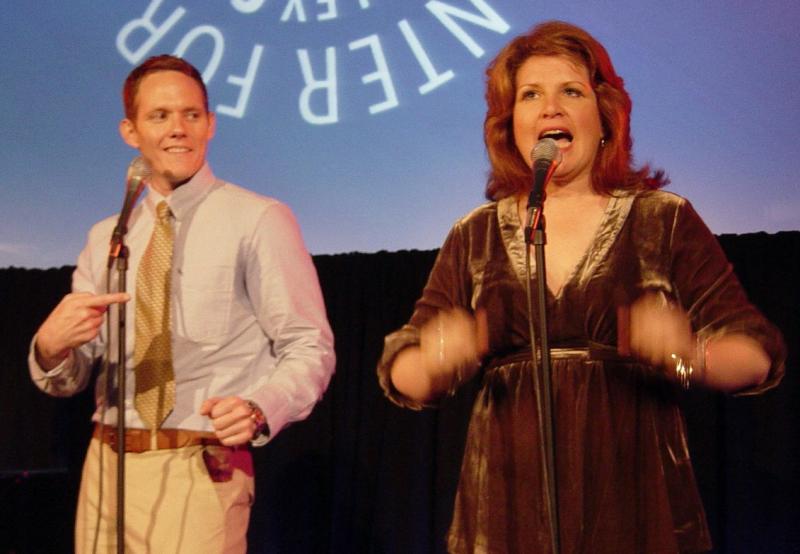
Bennett and Blackhurst have fun with "Fine and Dandy," the title song of Swift's hit show, which ran on Broadway at the same time as Gershwin's Girl Crazy. Gandy said that if you compare the two musicals' scores, "there's just so many fascinating points of connection. It's just a study in cross-pollination."
To sing what he called the "jaw-droppingly gorgeous ballad" from Fine and Dandy, "Can This Be Love?," Gandy introduced "the jaw-droppingly gorgeous, incandescent" Christine Ebersole. Joseph Thalken accompanies her.
Bennett—who costarred in Sympathy Jones at the New York Musical Theatre Festival last fall—performs "Sawing a Woman in Half," one of the songs Kay Swift wrote as a staff composer for Radio City Music Hall. It was used in a stage show there in 1935.
Blackhurst gives us "Nobody Breaks My Heart," the 11 o'clock number from Fine and Dandy.
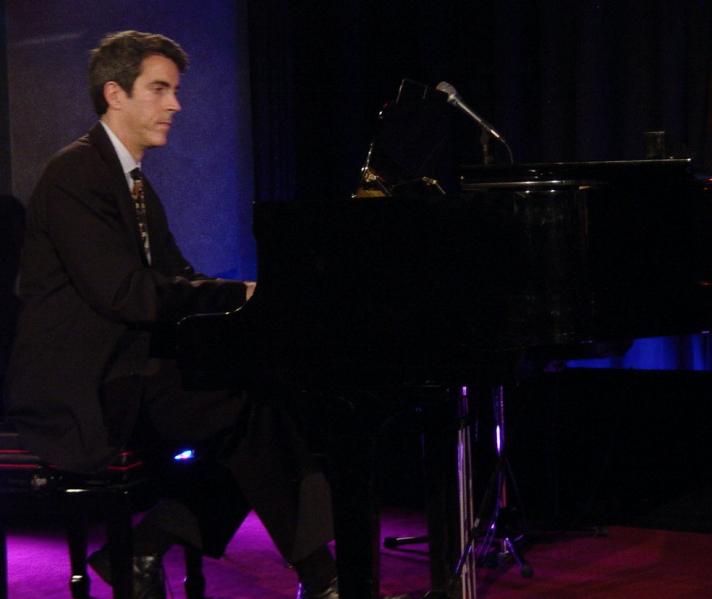
Pianist Joseph Thalken had the spotlight to himself for "Liza," a composition George Gershwin wrote for 1929's Show Girl and included in a songbook he published in 1932 containing his music as he would play it, with his embellishments and notations. Kay Swift did the transcribing for the book, and Gershwin dedicated it to her.
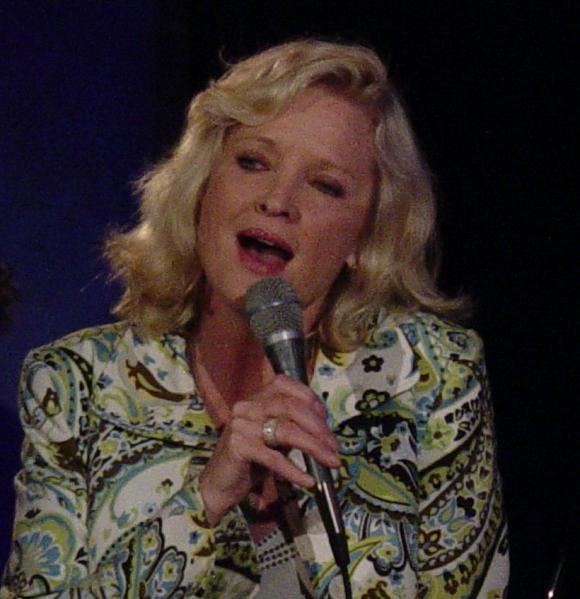
One of today's great ladies of the stage pays tribute to one from the past, as Ebersole sings Swift.
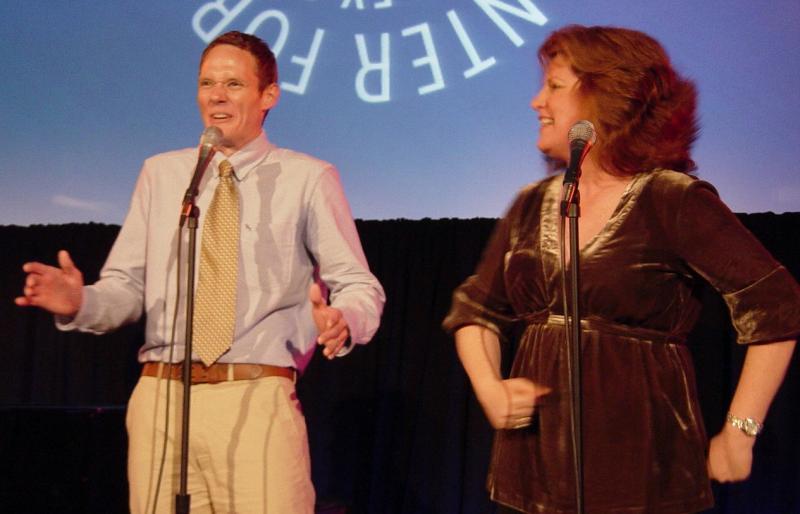
"Fine and Dandy" was a highlight of the evening—and of Swift's career. If you don't recognize the title, you surely know the melody: the "da-da-da-da, da-da-da-da-da..." that's warbled by amateur magicians and anybody who needs to signal that they're about to surprise or entertain you. Video clips screened at the event provided evidence of the tune's ubiquity: It's what the orchestra started playing when a streaker ran past David Niven at the 1974 Oscars, and it's turned up in everything from Laugh-In to Family Guy.

Kay Swift and George Gershwin. Not long after they met, according to Gandy, Gershwin gave Katharine Swift the nickname Kay, and then renamed Mayfair, a show he was writing, Oh, Kay.
Blackhurst will bring her acclaimed Ethel Merman tribute, Everything the Traffic Will Allow, to Princeton's McCarter Theatre on June 14 and do a Hoagy Carmichael cabaret with Billy Stritch at Birdland in NYC on June 16.
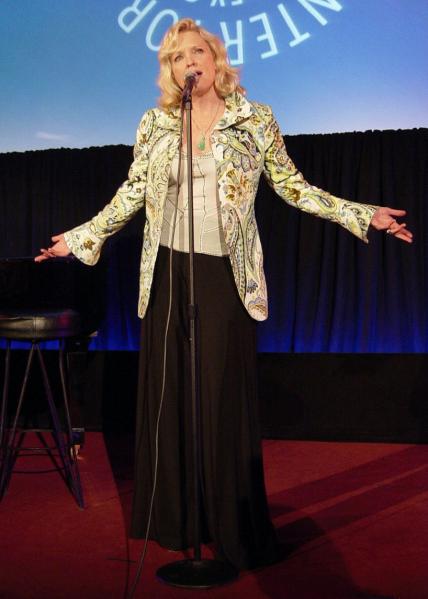
As a finale, Ebersole performed "There's a Boat Dat's Leavin' Soon for New York," from Porgy and Bess.
Videos
.png)